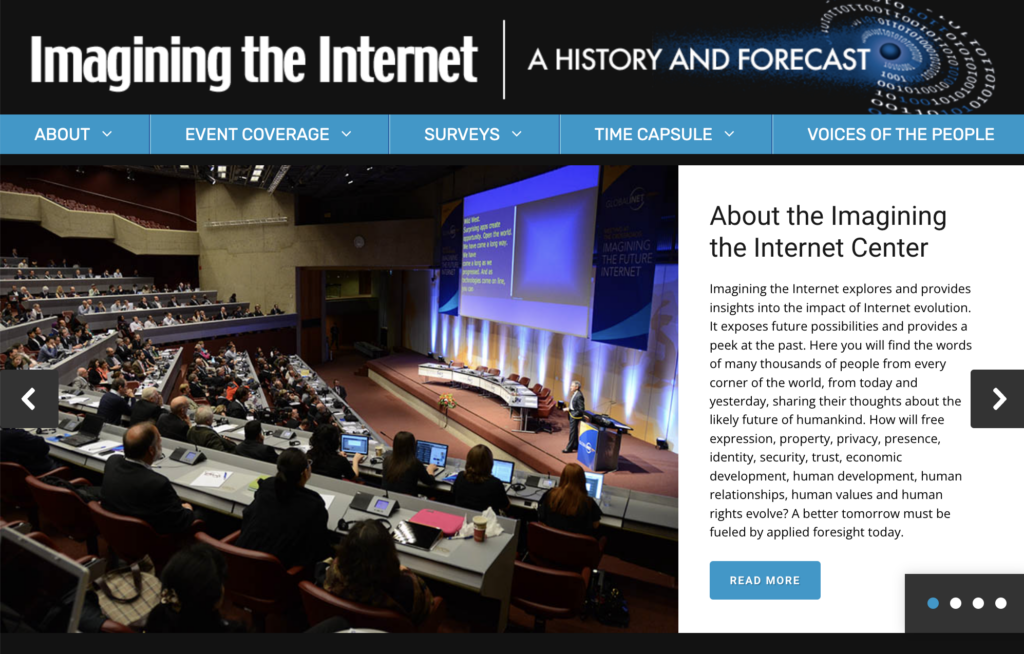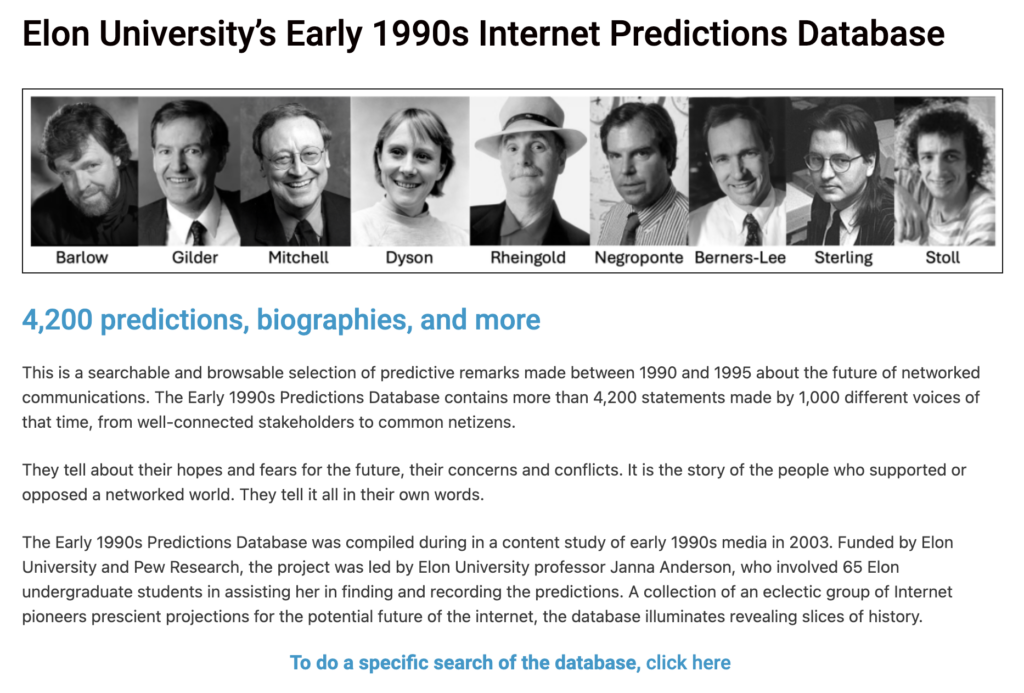
Imagining the Digital Future is an interdisciplinary research center focused on the human impact of accelerating digital change and the socio-technical challenges that lie ahead.
The Center was established in 2000 as Imagining the Internet and renamed with an expanded research agenda in 2024. It is funded and operated by Elon University, a nationally ranked private university in central North Carolina.
Imagining the Digital Future’s mission is to discover and broadly share a diverse range of opinions, ideas and original research about the likely evolution of digital change, informing important conversations and policy formation.
If you believe you have the appropriate expertise and you would like to participate in future ITDF studies, send an email to imagine@elon.edu briefly stating your relevant experience.
History of the Center
Imagining the Digital Future is built upon a foundation of excellence established by the earlier Center it succeeds: Imagining the Internet. Elon University’s School of Communications formally established the Imagining the Internet Center in the early 2000s, after Lee Rainie, as director of the Pew Research Center’s Internet and American Life Project, funded two 2000-2002 research studies led by faculty members Janna Quitney Anderson and Connie Ledoux Book: an ethnographic look at one neighborhood’s uses of the internet and a retrospective analysis of predictive quotes about the internet published in Wired and the New York Times between 1993 and 1995.
In 2003, the Center got its formal start when Pew Research funded Anderson’s deeper investigation into early 1990s predictions about the likely future of the internet. Rainie had been intrigued by similar work by MIT researcher Ithiel de Sola Pool in his work “Forecasting the Telephone: A Retrospective Technology Assessment,” and when Elon pitched the idea Pew funded research that resulted in the Early 1990s Internet Predictions Database, more than 4,200 predictions about the future of the internet made in public media between 1990 and 1995 by 1,000 different voices of the time, from well-connected stakeholders to common netizens. It became so popular that the Center opened up a public submissions site that attracted hundreds of freshly made predictions from people from around the world between 2004 to 2013 – Voices of the People. From 2005 to 2019 the Center also trained and fielded traveling teams of student journalists sent around the world to record coverage of some of the early 2000s most important global technology forums.
In 2004, the most exceptional research to be undertaken by the Center began after Rainie was encouraged by futurist Bruce Sterling to begin asking current-day experts to share their predictions. This sparked the first of what became a 20-year series of Elon-Pew “Future of Digital Life” (also known as “Future of the Internet”) reports in which smart folks shared their views on the potential future of the Internet. Rainie and Anderson led this research project under the auspices of Elon’s Imagining the Internet Center and Pew Research from 2004 through 2023, completing more than 50 reports. Each contains hundreds to thousands of predictions; most number more than 100 to 200 pages in length.

Among the issues and trends Imagining the Internet has partnered with Pew Research to ask experts about are the best and worst of digital change expected by 2035, the future of human agency; the future of XR and the metaverse; effects of toxic social media on democracy and society; hopes for 2035; the future of ethical AI design, the digital new normal after the 2020 outbreak; the future of democracy in the digital age; the future of social and civic innovation; the next 50 years of digital life; about AI and the future of humans; the future of digital life and well-being; the future of truth; the dangers of being code-dependent; about fake news and the future of discourse; the future of job training; about infrastructure vulnerabilities; and the future of trust in online interactions. Throughout its history, Imagining the Internet involved hundreds of Elon student, faculty, staff and alumni in its research and partnered not only with Rainie but also a number of other Pew Research staff.
Among the Center’s longtime supporters are many Internet Hall of Fame members, including Vinton Cerf and Alejandro Pisanty, Internet pioneer and journalist Esther Dyson, well-known digital experts and analysts including Ben Shneiderman, danah boyd, Beth Noveck, Sean McGregor, Jonathan Grudin, Louis Rosenberg, Avi Bar-Zeev, Maja Vujovic and Barry Chudakov, leaders with the Internet Engineering Task Force, the Internet Society, the Institute of Electrical and Electronics Engineers (IEEE), the Institute for the Future, the Millennium Project and the hundreds of additional experts on digital life who have been contributing their insights in its studies since the early 2000s.
A more-comprehensive history of the original Center can be found in the archived website of Imagining the Internet.
In 2024 Imagining the Internet was renamed the Imagining the Digital Future Center and expanded to appropriately broaden its scope of research and Rainie joined Elon as the Center’s founding director and scholar-in-residence. (Pew Research is no longer partnering with Elon on canvassing experts about the future of digital life.)
The Center is continuing its canvassings of global tech experts and publishing new reports to add to the “Future of Digital Life” series. It is also undertaking simultaneous U.S. public opinion polls that gather views on the same topics on which the experts share insights.
February 29, 2024, ITDF released its first new research report, “The Impact of Artificial Intelligence by 2040,” for which, in two separate studies, a large group of global digital life experts and the U.S. general public were asked to share their opinions on the likely future impact of AI. The global experts predicted that as these tools advance we will have to rethink what it means to be human and we must reinvent or replace major institutions in order to achieve the best possible future. The issues the Americans polled were most concerned about are the further erosion of personal privacy, their opportunities for employment, how these systems might change their relationships with others, and AI applications’ potential impact on basic human rights.



